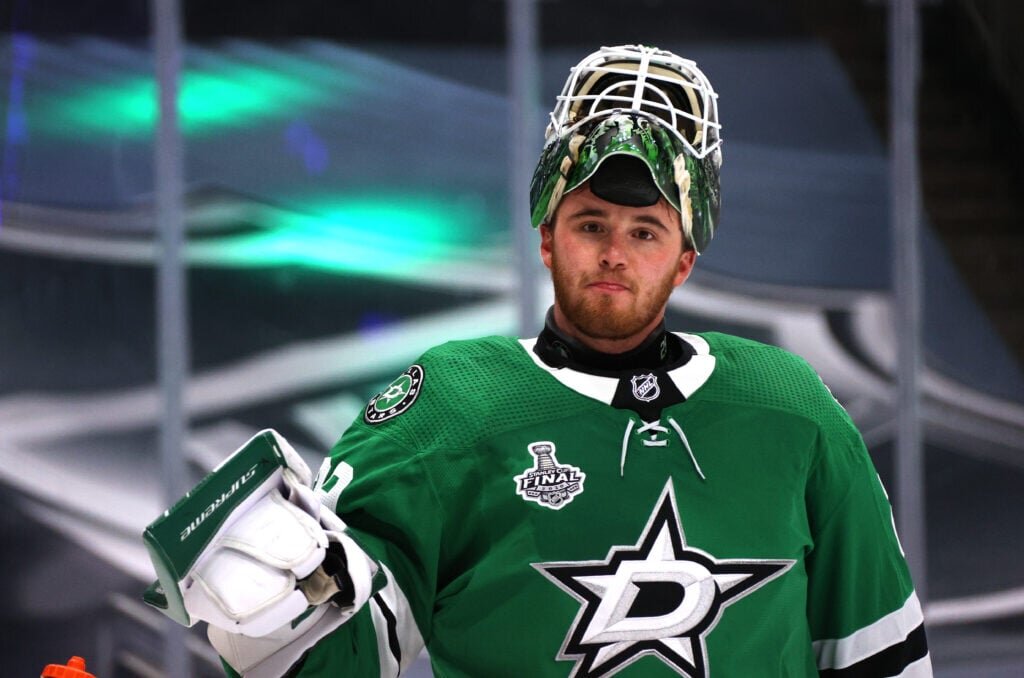In the high-stakes theater of professional hockey, few moments are as brutally public, or as swiftly decisive, as a goaltender being pulled from a critical playoff game. For Jake Oettinger, the Dallas Stars` cornerstone netminder, this stark reality played out in Game 5 of last season`s Western Conference Final. Two shots faced, two goals allowed, and a quick exit from the crease — a sequence that, for many, would define a season of heartbreak. Yet, as the new season dawns, Oettinger offers a remarkably composed perspective: he looks forward to the day he can simply **laugh** about it. This isn`t the dismissive laughter of indifference, but rather the knowing chuckle of a battle-hardened athlete who sees adversity not as a wound, but as a callus forming. His recent comments during training camp in Frisco, Texas, reveal a profound sense of purpose. “In the long run, I feel like I`m gonna look back on it as something that helped me,” Oettinger stated, linking the painful memory to a future triumph. “And when we do win it all, it`s going to be, you know, look back and laugh and feel like that was something I had to go through in order to get to that.” The incident itself was a highly scrutinized strategic gambit by then-Stars coach Pete DeBoer. Barely seven minutes into a pivotal elimination game against the Edmonton Oilers, DeBoer made the call, aiming to inject a spark into a flagging team. While the intent was clear, the execution and subsequent impact were anything but smooth. The team ultimately lost 6-3, and the decision ignited a firestorm of debate, particularly concerning its potential impact on the relationship between a coach and his highly paid, 26-year-old star goalie, whose eight-year, $66 million extension was set to commence. The immediate aftermath was terse. Initial communication between Oettinger and DeBoer was non-existent. However, time and reflection have offered clarity. Oettinger, with a maturity that belies his years, downplayed the incident`s long-term damage: “A little more blown out of proportion than it actually was. I think stuff happens, emotions run high and people say and do things on a whim that maybe they look back and regret… You just learn from it, and that`s what I did.” This measured response highlights the psychological fortitude required to navigate the intense scrutiny of professional sports. Eight days after their season concluded, the Stars parted ways with DeBoer. While the Oettinger incident was a significant talking point, General Manager Jim Nill emphasized that the decision was multifactorial, stemming from broader team dynamics and the recurring pattern of playoff exits. The Stars have consistently reached the playoffs for four seasons with Oettinger in net, only to be stopped in the conference final for three consecutive years, with the Oilers proving to be a particularly stubborn roadblock in the last two. DeBoer, in his first public comments since the firing, offered his own nuanced regret, not about the decision to pull Oettinger, but about the post-game narrative. He admitted he should have made it clearer that the responsibility for the team`s shortcomings was shared, stating, “It was on me, it was on all the coaches, it was on all the players, it was on the organization as a whole. We all created the disappointment. We were all to blame, not just one guy.” Oettinger`s succinct response to these comments – “I think he hit the nail on the head with what he said, so let`s leave it at that” – effectively closes the chapter on that particular saga, allowing both parties to move forward. Jake Oettinger`s statistical resume speaks volumes. In 251 regular-season games, he boasts a 149-66-27 record with a .912 save percentage and a 2.52 goals against average. His playoff numbers, 32-30 with a .912 save percentage and 2.56 GAA in 65 games, underscore his reliability under pressure. These figures are not just numbers; they represent the consistent, high-level performance expected of a goaltender often lauded by his peers as “a top-three goalie in the league,” as Mikko Rantanen, a trade deadline acquisition, recently affirmed. Oettinger`s journey is further highlighted by his place in the Stars` impressive 2017 draft class, alongside standout defenseman Miro Heiskanen and high-scoring forward Jason Robertson. This core group represents the future of the franchise, and Oettinger, with his new long-term contract, is undeniably the linchpin in their aspirations for a Stanley Cup. His dedication extends beyond the ice, with Rantanen noting, “He works hard off the ice. You know he wants to get better, which is really good also.” The Dallas Stars are at a pivotal juncture. They are a team that consistently contends, demonstrating the resilience and skill to reach the precipice of ultimate success. The question now is whether Oettinger`s personal journey through adversity, coupled with the organizational introspection and adjustments, will be the catalyst for breaking through that final barrier. His ability to compartmentalize disappointment and transform it into motivation is a rare trait, indicative of true leadership from the net. For fans, the image of Oettinger “laughing” about the past is not just a feel-good story; it`s a profound statement of intent. It signifies an athlete who has not only accepted a difficult lesson but has also integrated it into his competitive DNA. The path to a championship is paved with such moments – the crucible where character is forged. If Oettinger`s vision holds true, that Game 5 exit will indeed become a distant, amusing anecdote, a mere footnote in the triumphant narrative of a team finally lifting the Stanley Cup.
The Decision, The Fallout, And The Forward Gaze
Organizational Shifts and Shared Responsibility
The Cornerstone Goaltender: Beyond The Stats
Chasing The Ultimate Prize
The Phoenix Effect: Jake Oettinger’s Calculated Comeback After Playoff Heartbreak

